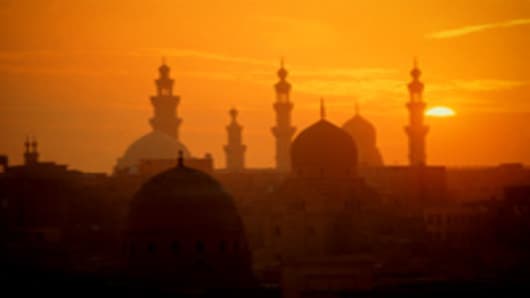As protestors prepare to rally in Tahrir Square once again on Tuesday, the renewed anxiety about Egypt’s fragile political process serves a potent reminder that despite the election of a new President, the country’s power structure has yet to be fully defined.
President Mohamed Mursi’s decision to issue a decree reinstating parliament after a higher court had dissolved it was immediately seen as an overt challenge to the Supreme Council of the Armed Forces (SCAF), the military council which oversaw the transition following the ousting of Hosni Mubarak.
In a statement read out on state television, the SCAF defended the move, pointing to the ruling by the Supreme Constitutional Court, adding it “hoped all institutions of state will respect constitutional decrees”.
As observers scrambled to ascertain the implications, U.S. Secretary of State Hilary Clinton called on all parties to work together.
"We strongly urge dialogue and concerted effort on the part of all to try to deal with the problems that are understandable but have to be resolved in order to avoid any kind of difficulties that could derail the transition that is going on," Clinton told a news conference in Vietnam on Tuesday.
A power struggle between the military council and the Muslim Brotherhood would come as no surprise. Analysts have repeatedly told CNBC that the inauguration of Mursi only marked the beginning of a prolonged tug of war between the two influential and historically acrimonious entities. In the still ambiguous lines of authority in the Arab World’s most populous state, the current tussle centers on legislative powers.
Indeed, the volatility of short-term sentiment towards Egypt may come across as slightly overwhelming, best exemplified by the staggering reactions on the local stock exchange. After Mursi’s decree, the market plummeted to close 4.15 percent lower on Monday. Recall the reaction after the announcement of Mursi as the country’s new President. Investors kept buying up shares, taking a brief intermission after hitting the circuit breakers, and then resuming the buying spree. The day ended in gains of 7.6 percent, a figure that caught the attention of fund managers around the world.
The response to the latest chapter of events on some of the exchange-traded funds (ETFs) that track Egypt’s index was perhaps more telling, with the Market Vectors Egypt ETF losing close to 6.2 percent in the first trading day of the week.
And the lack of predictability in Egypt’s political drama is keeping its economy from recovering, with policy makers unable to capitalize on what many have described as solid fundamentals and attractive demographics.
In a note late last week, Renaissance Capital reiterated its belief that in the medium term there was still “significant upside potential” in Egypt’s equity market and citing “low employment growth” as the currently biggest problem.
But the short-term horizon is still plagued by an uncertain recovery in key economic growth drivers, such as tourism and foreign direct investment (FDI). The absent momentum in various sectors can depend little on a recently passed government budget that analysts agree is unrealistic to start with, projecting an eight percent deficit for the fiscal year 2012-2013.
In a bid to address the financing gap, Egypt has been urged to conclude its negotiations with the International Monetary Fund (IMF) for a $3.2 billion loan. With legislative powers still being debated, such a politically-charged decision in a land where foreign aid is frowned up will not come swiftly.
Yousef Gamal El-Din is CNBC's Middle East Correspondent and contributes to the channel’s flagship shows, as well as analysis for CNBC.com.
Stay in touch with him on Twitter at http://www.twitter.com/youseftv @youseftv


